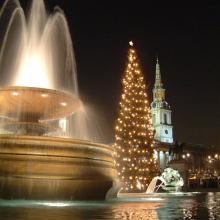Emmanuel
HUMANITY HAS BEEN reaching ever since Eve put her hand out and plucked the forbidden fruit. Since then, our acts of extension have been plagued far too often with violence and, in the end, death and despair. Philip Kolin’s new book of poetry, Reaching Forever: Poems, takes on those stretches and examines them with grace. His book is a fresh take on what it means to be loved and loving.
In the poem “God Comes to the Eternal Gate Holiness Church,” Kolin makes short work of people whose reaching is unsuccessful, via one of my favorite lines: “Bystanders down country roads reach out to him.” In other words, the spiritual life is not one for spectators but for those who do God’s will.
Author's Note: As we close out Advent, when we so quickly determine what’s our legal right or what we’re owed or what “the Bible really says” when, after all, we’re just simply too quick to judge. In these days where we must affirm #BlackLivesMatter, where we must stand up for victims of rape and abuse, and where we must struggle with our LGBTQ sisters and brothers for full inclusion, sermons like this are humbly offered.
We know the Christmas story well.
Those of us that have grown up with regular, annual, church-going rhythms — we essentially hear this story once a year.
Even so, those with no regular church commitments — people from all walks of life, people of faith or no particular faith, people from varied faiths — if you asked your friend, your neighbor, your cousin, a stranger on the street, I bet at least 50 percent of the time they’d be able to share the gist of the story:
Jesus was born to a virgin named Mary.
Mary was married to a guy (named Joseph).
There were angels, and wise men, and shepherds.
And I think there was a manger.
We know this story well.
But we hear it so often it becomes rote — literally a mechanically, automatically, mindlessly routine on repetition in our brains.
Yeah, yeah, yeah — 6lb 8oz baby Jesus, in a manger, Virgin Mary, Adopted Dad Joseph, sheep, shepherds, angels, stars at night, wise men, white Christmas, Rudolph the Red Nosed Reindeer …
You get my point.
So, let’s hear the story one more time and lean in a bit to this wild world of dreams, angels, and ancient Jewish marriage contracts.
There is power in a name.
One of the things happening in our world right now is that people are “naming” injustice. No longer are we just talking about statistics, numbers and data. We are lifting up the names of the victims of a failed justice system. And there is something in a name that humanizes and personalizes the issue, and wakes us up: Trayvon Martin, Michael Brown, Eric Garner, Tamir Rice.
The numbers have names.
They remind us of the collateral damage of a failed system, and the urgency of this moment. We can’t make injustice history until we make injustice personal.
For many people of color, the victims of injustice have had names for a long time. Emmett Till helps us know how far we have come; Eric Garner reminds us how far we still have to go. But now these names are being talked about in homes and around dinner tables all over the world.
Every name of a life lost is an image of God. When we lost them, we lost a little piece of God’s image in the world. They are friends, sons, sisters, fathers and neighbors.
I.
The wailing and the murmured prayers,
the animal ruckus, and coin against coin,
smoke hanging in the temple spaces—
offerings that bear our love to the seat of heaven.
For sixty years my soul has leaned
so hard toward the Almighty, I’m open
like a flower drenched with light
that blossoms into words.

Christmas lights in London's Trafalgar Square, St. Martin's in the Field behind. Via http://www.wylio.com/credits/Flickr/839615
I’m not sure we can quite get our heads around the latest ‘war’ being waged in the United States – the ‘war on Christmas’.
Visions of the 101st Airborne heading towards the North Pole abound. Anti-reindeer defense weapons, covert elf anti-merriment operatives and a unilateral ban on all copies of A Christmas Carol (in its various media iterations)? Is that what we have come to?
Surely — and thankfully — not, but given some of the rhetoric that is thrown around in the media at this time of year, you might be forgiven for thinking so!
Given that most reporting about religion in the UK and Europe usually includes the phrase “an increasingly secular country," you might think that the "war on Christmas" back on the old sod is even more sustained and sophisticated than in the United States.
Picture heavily fortified nativity scenes being assaulted by atheist flash mobs chanting “HAPPY HOLIDAYS!” if you will.
Well, I’m sorry to tell you that I’ve yet to witness such a terrifying scene on the streets of London.
I love the lights and the love, which somehow seems a little easier during this season. Most of all I love the message: God made flesh, becoming human, and dwelling among us.
Our giving and receiving of gifts is most of all a reminder of the good gifts that God has already given to us. There is an old Sunday School saying that goes, "You can’t out give God."
No matter how much we give to those around us, it can never match the Light of the World entering into the darkness to be with us. Emmanuel, God with us, is the gift that can’t be out given.
In all the hustle and bustle of Christmas, don’t forget that. And don’t forget the people that you are especially thankful for.
When it comes to homeless youth the facts are simple, services in the City of Chicago are falling far behind the need. A survey of Chicago public school students from 2009/10 revealed 3,682 children who identified as being homeless and in need of shelter. In contrast there are approximately 189 beds for homeless youth (ages 18-25) funded by the City of Chicago. In 2010, 4,775 homeless youth were turned away from youth shelters for lack of room. To be clear, that was 4,775 instances where homeless youth sought shelter and were unable to find it. To date there are only 10 percent of the beds needed to provide safe shelter and supportive programs for the estimated number of Chicago's homeless youth.
In recent weeks, Facebook and other social media have clearly demonstrated their capacity to do far more than just allow us to keep in touch with our family and friends. They have proven to be powerful organizing tools, capable of assisting in the creation of broad international movements for social change. Social media has proven to be a particularly powerful tool in countries in which basic democratic rights such as a free press and the right to assembly are severely restricted. At the same time, Facebook and YouTube are increasingly rendering international borders as meaningless. Western media coverage of the recent popular uprising in Egypt consistently emphasized the catalytic role of Facebook in galvanizing youth and young adults to take action against an entrenched regime that had long been viewed as impenetrable. In the days after Mubarak's departure, both the New York Times and The Los Angeles Times published lead stories describing the role of certain Facebook pages in not only serving as a call to action, but as a space in which emerging activists in Tunisia and Egypt were able to share lessons with each other. These young activists had not only managed to evade the reach of both nations' security police, they had also sidelined older opposition parties such as the Muslim Brotherhood in Egypt.



